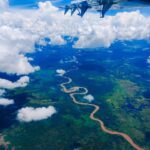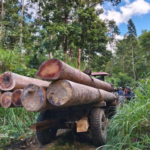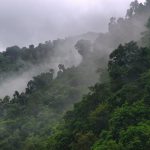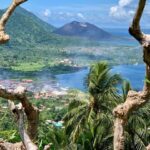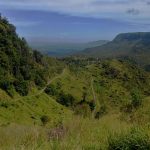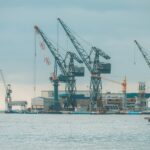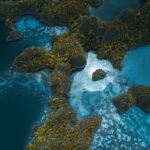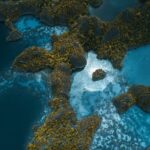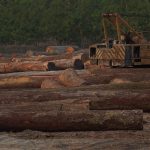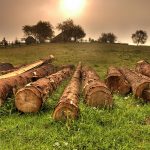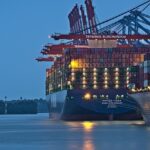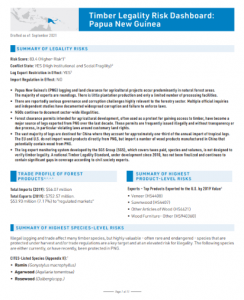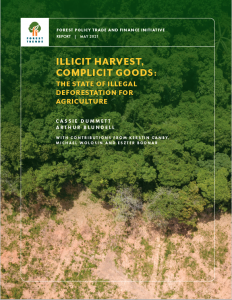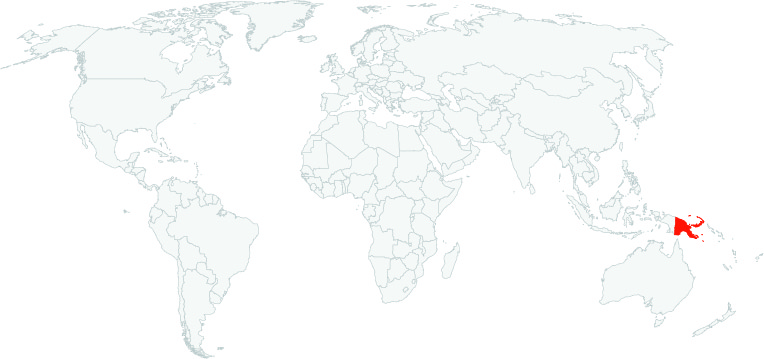
- Papua New Guinea’s (PNG) logging and land clearance for agricultural projects occur predominantly in natural forest areas.
The majority of exports are roundlogs. There is little plantation production and only a limited number of processing facilities. - There are reportedly serious governance and corruption challenges highly relevant to the forestry sector. Multiple official inquiries and independent studies have documented widespread corruption and failure to enforce laws.
- NGOs continue to document sector-wide illegalities.
- Forest clearance permits intended for agricultural development, often used as a pretext for gaining access to timber, have become a major source of logs exported from PNG over the last decade. These permits are frequently issued illegally and without transparency or due process, in particular violating laws around customary land rights.
- The vast majority of logs are destined for China where they account for approximately one-third of the annual import of tropical logs. The EU and U.S. do not import wood products directly from PNG, but import a number of wood products manufactured in China that potentially contain wood from PNG.
- The log export monitoring system developed by the SGS Group (SGS), which covers taxes paid, species and volumes, is not designed to verify timber legality. A national Timber Legality Standard, under development since 2010, has not been finalized and continues to contain significant gaps in coverage according to civil society experts.
Read more by downloading Papua New Guinea’s Timber Legality Risk Dashboard here.
A community advocacy group in Papua New Guinea says Prime Minister James Marape’s promise to stop issuing new forestry licences will do nothing to stop illegal logging destroying the country’s remaining forests. Marape reportedly told the Green Climate Fund in Port Moresby that no new forestry licences will be issued after 16 September, PNG’s 50th anniversary.
But ACT NOW campaign manager Eddie Tanago calls this an empty gesture because current licences will allow logging for many years to come, especially with the government failing to enforce its own rules.
He said at least one-third of current log exports still come from areas that were issued logging permits in the colonial era, 50 years or more ago. According to ACT NOT, these are permits that have been repeatedly renewed without the consent of the current generations of resource owners.
Papua New Guinea has five months remaining to fix its anti-money laundering and counter-terrorist financing (AML/CTF) systems or face the severe repercussions of being placed on the Financial Action Task Force’s (FATF) “grey list”.
The core of the problem, according to analysts, is a lack of effective prosecution and punishment for money laundering and terrorism financing.
High-risk sectors such as corruption, fraud against government programmes, illegal logging, illicit fishing, and tax evasion, remain largely unchecked by successful legal actions. Capacity gaps within key agencies like the Royal Papua New Guinea Constabulary and the Office of the Public Prosecutor have been cited as significant hurdles.
The NGOs stress that customary owners’ forests are being stolen by logging concessions, through Special Agriculture and Business Licenses (SABLs) and Forest Clearing Authorities (FCAs). For example, there has been no revocation of SABLs which were fraudulently obtained.
A new report focuses on Forest Clearing Authorities (FCAs), a type of logging license. It raises concerns that FCAs are being used to authorize large-scale logging. This report provides an overview of FCAs, which provide over a third of PNG’s log exports.
In 2023, the PNG Forest Authority announced a moratorium on new FCAs, and an audit of existing FCAs. No audit findings have been published yet.
The Australian Government wants to grow sustainable forest management in Papua New Guinea (PNG) and is now working with the country’s forest authority to improve plantation forestry and grow regional wood supply.
Papua New Guinea’s civic space is rated as ‘obstructed’ by the CIVICUS Monitor. Among concerns previously documented are the harassment and threats against human rights defenders, particularly those working on land and environmental rights, use of the cybercrime law to criminalise online expression, intimidation and restrictions against journalists and excessive force during protests.
In recent months, the authorities have used the cybercrime law to target a human rights defender for raising questions online on forest enforcement, while a journalist and gender-based violence survivor is also facing charges under the law. The court halted a logging company’s lawsuit against a civil society group while the government is pushing forward with controversial media legislation.
An ABC investigation has linked the Australian businessmen behind Papua New Guinea’s largest agroforestry project to key figures in a massive Indigenous land grab scandal in the country’s Western Province more than a decade ago.
Papua New Guinea’s Prime Minister James Marape announced the $1.8 billion development in late October, saying it was an “historical moment” for his country. He said it would see the construction of 600 kilometres of road in Western Province, at no cost to the government, with logs from the road corridor to be harvested and sold.
The road will likely pass through some of the last remaining tracts of commercially valuable rainforest in Papua New Guinea. Environmental groups, academics and politicians fear the new project could see large tracts of pristine rainforest destroyed.
Civil society groups and community representatives from across Papua New Guinea have gathered in Port Moresby to demand government action on the widespread abuse of Forest Clearing Authorities (FCAs). PNG’s Institute of National Affairs executive director, Paul Barker, said the abuse of FCAs has been ongoing since the mechanism was introduced, sidestepping due process for forest management through proper resource planning, landowner consent and use of FMAs.
More than one-third of all logs exported from PNG come from logging operations authorised under an FCA permit.
These permits are meant to facilitate land clearance for agriculture or other land use changes, but the civil society groups and organisations like the Institute of National Affairs can point to a large body of evidence that they are being systematically abused to allow large-scale logging of huge tracts of forest. The environmental campaigners, Act Now!, say there are currently more than 20 FCA logging operations in eight provinces across PNG which are contributing to widespread illegal and unsustainable logging.
A non government organisation in Papua New Guinea (PNG) has dressed down Prime Minister James Marape for claiming his government is sustainably managing the country’s forests. Marape made the comment at the United Nations General Assembly. The NGO, Act Now, said it has documented numerous examples of logging licences being issued for bogus agriculture projects and colonial era logging permits are still being renewed, in defiance of court orders and community opposition.
Speaking at the APEC Haus, a controversial conference centre built for the 2018 Asia-Pacific Economic Co-operation Forum, Pope Francis challenged PNG’s top foreign donors (namely China and Australia) to do more to end poverty and escalating violence in the region.
In addition, the Pope said that natural resources (including logging) should be developed in a “sustainable manner” that “improves the well-being of all, excluding nobody, through … international co-operation, mutual respect and agreements beneficial to all parties.”
This article calls for the restoration of SGS inspection, monitoring, verification of PNG’s timber exports.
To the loggers intent on chopping them down, Papua New Guinea’s rainforests are a chance to make money quickly. To the world’s conservationists — and to PNG’s government — they are a key front in the fight against climate change: a carbon sink to be preserved at all costs. Who will prevail depends on how ready the world is to pay those costs. Andrea Babon, an Australian environmental researcher who has studied carbon trading schemes in PNG, warns that there is a gap between rhetoric and reality. “Leaders have made amazingly strong statements with conviction on the international stage, but that has not translated into leadership at the domestic level,” she says. “Until someone can tackle the political economy of forests in PNG and the strong logging sector, then you are not going to see change on the ground.”
This article summarizes the science behind World Forest ID, but also gives a glimpse at the support provided by Australia, work now being done by IKEA (which used to source extensively from Russia and Belarus), and a recent Belgian investigation into illegally sourced wood imports.
Also reported here: Keeping Sanctioned Russian Timber Out of the EU Is Tricky. This Nonprofit Has a Solution. – WSJ
A Malaysian-owned logging company failed in its legal action against local NGO ACT NOW and a British academic who had released a report detailing potential money laundering linked to the company’s activities.
All nations have some unmapped or unofficial roads, but the situation is especially bad in biodiversity-rich developing nations, where roads are proliferating at the fastest pace in human history.
When ghost roads appear, local deforestation soars—usually immediately after the roads are built. We found the density of roads was by far the most important predictor of forest loss, outstripping 38 other variables.
Also reported here: Scientists find vast numbers of illegal ‘ghost roads’ used to crack open pristine rainforest (phys.org)
Wilmar International’s No Deforestation, No Peat, No Exploitation policy, announced ten years ago, marked a significant milestone in environmental conservation by prohibiting deforestation, peatland destruction, land-grabbing, and labor abuses in their global supply chain, impacting thousands of palm oil companies.
The policy, a result of global campaigning and intense negotiations, contributed to a dramatic reduction in deforestation for palm oil by over 90%, influencing other industries and contributing to the lowest deforestation levels in Indonesia, as well as progress in Malaysia, Papua New Guinea, and tropical Africa, argues Glenn Hurowitz, the Founder and CEO of Mighty Earth, who led the negotiation with Wilmar.
Hurowitz says this “success story” highlights the importance of private sector involvement, effective campaigning, diligent implementation, the necessity of continuous effort, and the insufficiency of data alone in driving change.
The forest industry earns more than AU $407 million a year in foreign exchange, unlike other sectors of the economy where money exchange stays offshore. There have been large investments in operations in the western provinces, such as at the PNG Forest Products plywood and veneer mill at Bulolo on the north coast, which is more than holding its own and not dependant on export markets.
The Pacific Islands are working towards a new Pan-Pacific Standard for Sustainable Forest Management. The new standard could include Fiji, Papua New Guinea, the Solomon Islands, Tonga and Vanuatu.
the new standard would greatly assist Trans-Tasman importers and provide a “green lane” for tropical timbers, most importantly demonstrating sustainable forest management. In New Zealand, the new standard could significantly assist in monitoring certified products imported into and sold through NZ building and construction networks.
PNG’s tax authority has imposed a historic £31 million assessment against a logging operator for tax evasion.
Internal Revenue Commissioner (IRC) General Sam Koim, who announced the audit findings on June 26, said: “The logging sector in PNG has long been suspected of involvement in tax evasion. Instead of turning a blind [eye], we have initiated over twenty audits since I took office… I am pleased to report that this is the first outcome of those audits.”
The recent security agreements between Papua New Guinea and the United States are a good deal for the planet—but a tough pill for Beijing to swallow, and one that might come with potential blowback.
The new agreements accelerate coastal security strategies that also help with climate change adaptation by protecting vulnerable fisheries. These new moves point toward greater opportunities for further climate mitigation and resilience, using existing climate programs in Papua New Guinea and international climate financing. Papuan Prime Minister James Marape has often spoken of his enthusiasm for climate financing, which is also a high priority for the whole of the Blue Pacific Continent 2050 strategy that was endorsed and launched last July 2022 by a coalition of island nations. With the Biden administration set to host a major U.S.-Pacific island summit this fall, American interest in Pacific climate adaptation is growing.
But one aspect of these programs that American officials discuss only behind closed doors is their role in countering Chinese influence in the Pacific. Some of the programs are aimed at curbing environmental damage committed largely by Chinese companies through questionable fishing practices and widespread logging and mining. Pushing Chinese firms with dubious environmental practices out of Papua New Guinea and elsewhere also helps reduce the role of Chinese money, and influence, in Pacific politics—a double win for the United States.
The United States and Papua New Guinea have signed a new defence and maritime cooperation agreement to combat illegal fishing, illegal logging and drug smuggling in PNG waters. The two countries also agreed to further climate-change cooperation when regional leaders met in Port Moresby for the US–Pacific Islands Forum Leaders’ Dialogue.
Chairman for Law and Order, Edwin Maigen, called for the investigation, charging and harsh punishment of three Malaysians, whom he alleges are connected to logging companies operating in New Ireland. He accused Malaysian companies of monopolizingi the logging industry in PNG and harming the country’s people and infrastructure.
Acting Provincial Administrator and Forestry Enforcement Crime Unit Chairman Moses Taram expressed his concern about the incident and announced a crackdown on illegal activities at logging camps.
A task force comprising customs, immigration, police and labor will investigate logging camps to ensure that these companies operate within the legal limits.
The immigration and Citizenship Authority Special Operations team has repatriated 22 men into Port Moresby from Wewak, East Septik Province over alleged involvement in illegal logging in Hawain.
The duplication of land titles has become an issue and the Minister for Lands, John Rosso is determined to correct a lot of those illegal deals and have the land transferred back to the original title holders.
Papua New Guinea’s Centre for Environment Law and Community Rights, or CELCOR, wants police working for logging companies to be sacked from the force. This follows the killing of two landowners and a policeman at a forestry site in East Sepik last month. Those deaths have sparked a parliamentary call for an inquiry into police staff working for logging companies as security.
Guardian analysis of trade data has revealed that China received more than half the total tonnes of seafood, wood and minerals exported from the region in 2019, a haul worth $3.3bn that has been described by experts as “staggering in magnitude”.
The country’s mass extraction of resources comes as China has deepened its connections with governments across the region, amid a soft power push that sees it rivalling the influence of the US and Australia in the Pacific.
The 2017 National Assessment of Risk by the Bank of PNG states that ” The threats and vulnerabilities most likely to have severe domestic ML consequences for PNG are tax evasion (including GST fraud), illicit drug related activities and the movement of funds obtained from bribery and corruption. The laundering of funds derived from illegal logging and fishing are more likely to accrue offshore, although some of this will find its way back to PNG to support continuation of these activities. This has international implications for PNG because those countries face a domestic ML problem created by criminal offences within PNG and this requires cooperation between PNG authorities and those in neighbouring jurisdictions.
The highest priority for the offshore ML of funds generated within PNG is to address the cause: corruption and the ongoing illegal logging and fishing. PNG can and should work with other jurisdictions to trace, locate, freeze and recover these criminal proceeds but addressing the problem at its source is critical.”
Click here to access the Global Illegal Logging and Associated Trade (ILAT) Risk assessment tool and to download the Forest Trends User Guide describing the functionality of the ILAT Risk Data Tool.
Click here to access the Cattle Data Tool.

